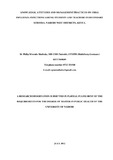| dc.description.abstract | Influenza is an infection of the human respiratory tract which is caused by influenza viruses type A, B and C. It causes significant morbidity in Kenya, leading to a lot of lost time of productive work and school absenteeism for children. The cause of influenza, its mode of transmission, management, prevention and control are not well understood in Kenya. This study was carried out to describe the knowledge, attitudes and management practices on viral influenza infections among secondary schools in Nairobi West Districts, Kenya.
The overall objective of the study was to determine the knowledge, attitudes and management practices (KAP) about the cause, transmission, management, prevention and control of viral influenza infections among secondary school students and staff in Nairobi West District in Kenya. The design of the study was cross-sectional involving 343 student respondents from 9 secondary schools, 3 district education officers, and 9 school principals. Data was collected using a closed ended questionnaire and KII guide.
Most of the respondents were in the 15-19 year's age-group (89%). Majority of the respondents interviewed did not know that viruses cause influenza and had a lot of misconceptions on the cause(s) of influenza. Respondents got information about influenza from the television (41 %), class teacher (40%), newspaper (38%), and radio (27%), in that order. More than a third (36.4 %) of the respondents were aware that a seasonal influenza vaccine was available in Kenya.
Higher educational status (superior class in school) in our cohort was a significantly negative predictor of the good management practice of visiting a health care provider when sick with influenza, showing that educational status alone does not determine behavior. In this study, the girls had significantly better prevention and control practices for influenza infections compared to the boys.
Overall, about two thirds (62.4%)t of the respondents did not know the correct prevention and control practices of influenza infections, Of the respondents who knew the cause of influenza, about 64% did not practice the correct prevention and control practices. The study found that, age, sex, and level of education (as a proxy of socio- economic status) did not predict knowledge, attitudes or management practices of influenza infections. The majority of the respondents, (81.4%) felt that influenza was an important public health problem in Kenya. There was a statistically significant relationship between attitudes and management practices for influenza infections
The research concluded that most of the respondents in this study were in the 15-19 years agegroup. A majority of them did not know that viruses cause influenza infections. Of interest in this study, higher educational status (Superior class in school) was a significant negative predictor of the correct management practice of influenza infections, showing that educational status alone does not determine behaviors.
In this study, the girl respondents had significantly better prevention and control practices for influenza infections compared to the boys. However, most of the respondents did not know the correct prevention and control practices of influenza infections. There was a statistically significant relationship between attitudes and management practices for influenza'infections as those who felt influenza was an important public health problem, had better management practices for these infections.
Respondents who mentioned that they received current infonnation on influenza from their class teachers had significantly better management practices for influenza compared to those who did not. Similarly, the respondents who received information on influenza through media sources had significantly better management practices
for influenza infection compared to those who did not.
The researcher recommends that:
I. There is need to develop appropriate IEe materials or educational materials on the correct management practice for influenza infections and include these in all classes as part of the school health program.
2. There is need to include in the school health program the correct prevention and control practices of influenza infections.
3. Through the school health program, there is need to improve the attitudes on the health impact of influenza infections among the respondents as this is likely going to improve their management practices of these infections.
4. There is need to develop influenza infections information and disseminate it through the various media channels, preferably during increased influenza activity seasons. | en_US |

